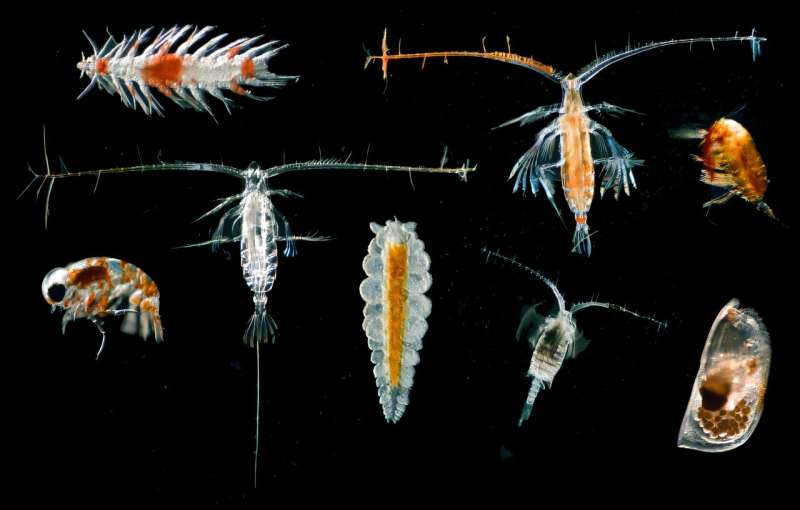Science
Study Reveals Deep-Sea Mining Waste Threatens Marine Life

A groundbreaking study from researchers at the University of Hawaii at Mānoa reveals that waste discharged from deep-sea mining operations in the Pacific’s biodiverse Clarion-Clipperton Zone (CCZ) poses a significant threat to marine life in the midwater “twilight zone.” Published in Nature Communications on November 6, 2025, this research highlights the potential ecological disruptions caused by mining activities at depths of 200 to 1,500 meters below sea level.
The study indicates that approximately 53% of all zooplankton and 60% of micronekton, which rely on zooplankton for food, would be adversely affected by waste discharge. This disruption in the food web could extend to higher predators, impacting entire marine ecosystems.
Lead author Michael Dowd, an oceanography graduate student at the UH Mānoa School of Ocean and Earth Science and Technology (SOEST), explained the implications of the findings. “When the waste released by mining activity enters the ocean, it creates water as murky as the mud-filled Mississippi River. The pervasive particles dilute the nutritious, natural food particles usually consumed by tiny, drifting zooplankton,” he stated.
Environmental Impact of Mining Waste
The study, titled “Deep-sea mining discharge can disrupt midwater food webs,” carefully examines the content and effects of mining waste released during a 2022 mining trial in the CCZ. This expansive area is targeted for the extraction of deep-sea polymetallic nodules, which contain critical minerals such as cobalt, nickel, and copper. Researchers collected and analyzed water samples from the depths of waste discharge, discovering that these particles had significantly lower concentrations of amino acids compared to naturally occurring particles that sustain life in these depths.
Co-author Erica Goetze, an oceanography professor at SOEST, emphasized the broader implications of these findings. “This isn’t just about mining the seafloor; it’s about reducing the food for entire communities in the deep sea,” she noted. Many animals at the depth of discharge depend on naturally occurring small detrital particles, which are replaced by mining plume particles.
As countries ramp up efforts to meet the growing demand for metals necessary for electric vehicle batteries and other low-carbon technologies, about 1.5 million square kilometers of the CCZ are currently licensed for deep-sea mining operations.
Regulatory Gaps and Future Concerns
The process of deep-sea mining involves collecting nodules from the seafloor along with seawater and sediments, which are then transferred to collection ships. The sediment waste, containing seawater and pulverized nodule particles, must be returned to the ocean. Although the release depth for this waste is not clearly defined, some mining operators have proposed discharging it within the twilight zone. The environmental impact of this practice remains poorly understood, posing significant challenges for the establishment of comprehensive regulations, which are currently lacking.
The twilight zone is home to a remarkable diversity of life, including krill, fish, squid, and gelatinous species like jellyfish. These organisms play a crucial role in the ocean’s carbon transport system, which is vital for both marine and human health.
Co-author Jeffrey Drazen, a professor of oceanography and deep-sea ecologist at SOEST, described the implications of mining waste on marine ecosystems. “Our research suggests that mining plumes don’t just create cloudy water—they change the quality of what’s available to eat, especially for animals that can’t easily swim away,” he explained. “It’s like dumping empty calories into a system that’s been running on a finely tuned diet for hundreds of years.”
The findings raise urgent concerns about the potential long-term effects on marine ecosystems if large-scale commercial mining proceeds without adequate environmental safeguards. For instance, Pacific tuna fisheries operate in the CCZ, meaning that mining waste could have repercussions for fish populations that end up on dinner plates worldwide.
“The time to make informed decisions is now,” said Brian Popp, co-author and professor of earth sciences at SOEST. “If we don’t understand what’s at stake in the midwater, we risk harming ecosystems we’re only beginning to study.”
The authors of the study hope that their findings will influence international regulatory decisions currently being formulated by the International Seabed Authority and the National Oceanic and Atmospheric Administration, which is responsible for reviewing environmental impacts of U.S.-led deep-sea mining initiatives. They call for expanded research to protect the full vertical extent of ocean ecosystems.
“Before commercial deep-sea mining begins, it is essential to carefully consider the depth at which mining waste is discharged,” Drazen added. “The fate of these mining waste plumes and their impact on ocean ecosystems varies with depth, and improper discharge could harm communities from the surface to the seafloor.”
Additional authors of the study include oceanography graduate students Victoria Assad and Alexus Cazares-Nuesser, along with oceanography professor Angelicque White. More information can be found in their study published in Nature Communications, DOI: 10.1038/s41467-025-65411-w.
-

 Science3 months ago
Science3 months agoUniversity of Hawaiʻi Joins $25.6M AI Project to Monitor Disasters
-

 Business3 months ago
Business3 months agoForeign Inflows into Japan Stocks Surge to ¥1.34 Trillion
-

 Entertainment2 months ago
Entertainment2 months agoHudson Williams Gains Popularity as Breakout Star on Heated Rivalry
-

 World3 months ago
World3 months agoBoeing’s Merger with McDonnell Douglas: A Strategic Move Explained
-

 Science2 months ago
Science2 months ago$1.25M Grant Advances Hawaiʻi’s Real-Time Hazard Monitoring
-

 Entertainment3 months ago
Entertainment3 months agoSydney Sweeney Embraces Body Positivity Amid Hollywood Challenges
-

 Top Stories3 months ago
Top Stories3 months agoBOYNEXTDOOR’s Jaehyun Faces Backlash Amid BTS-TWICE Controversy
-

 Top Stories3 months ago
Top Stories3 months agoUrgent Farewell: Joleen Chaney Leaves Legacy at KFOR
-

 World3 months ago
World3 months agoFrench Film Explores Group Therapy in ‘Group – The Schopenhauer Project’
-

 Top Stories3 months ago
Top Stories3 months agoMarc Buoniconti’s Legacy: 40 Years Later, Lives Transformed
-

 Lifestyle4 months ago
Lifestyle4 months agoKelsea Ballerini Launches ‘Burn the Baggage’ Candle with Ranger Station
-

 Top Stories3 months ago
Top Stories3 months agoCarson Wentz Out for Season After Shoulder Surgery: Urgent Update









